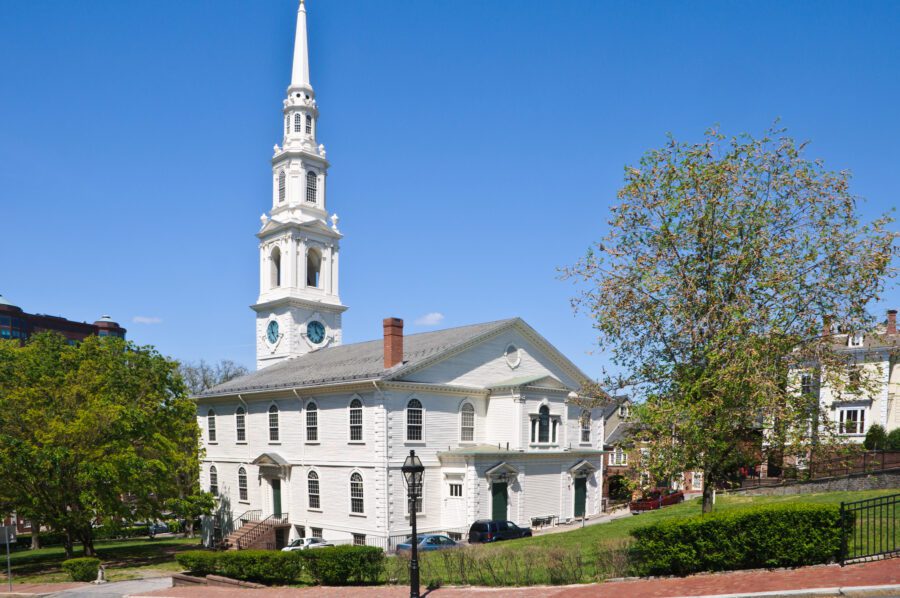Where does the Baptist commitment to religious liberty originate? The Universal Declaration of Human Rights states, “Everyone has the right to freedom of thought, conscience and religion; this right includes freedom to change his religion or belief, and freedom, either alone or in community with others and in public or private, to manifest his religion or belief in teaching, practice, worship and observance” (Article 18). 1https://www.un.org/en/about-us/universal-declaration-of-human-rights While that sounds nice, a document written and adopted by the United Nations in 1948 does not necessarily bind the conscience of the Christian. Instead, we must ask, what does the Bible have to say on the topic?
What does the Bible say about religious liberty?
Ever since the Baptist movement arose out of English Separatism in the first decades of the 17th century, Baptists have argued this very point from Scripture. Responding to the merging of the state’s sword with the sword of God’s Word in medieval Christendom, Baptists followed the early work of Martin Luther in separating the temporal domain from the spiritual domain. However, going beyond Luther, Baptists denied the state any jurisdictional authority over the church.
Holding to an ordering of biblical covenants that prioritizes regenerate church membership and baptism of believers alone, Baptists have nearly universally promoted a political theology that honors individual conscience and safeguards religious conviction from political coercion. For Baptists, the goal of nation-building via the sword has typically ranked beneath the priority of kingdom-building via Spirit-filled gospel preaching.
In recent years, some have looked at the secularization of Western culture and questioned whether the Baptist approach, which ultimately won the day in the United States, was the right one. Some Baptists have even wondered if Baptist theology necessitates a political theology that champions religious liberty. Is it possible, some are wondering, to combine Baptist theological distinctives with the political theology of the magisterial reformers? Can Baptists stay true to their convictions while turning for assistance to the state to enforce the church’s agenda?
On these questions, I side with the historic Baptist position and maintain that “magisterial Baptist” is an oxymoron. To abandon religious liberty, Baptists would have to also abandon a long tradition of theological reflection on the Bible—a tradition that makes them a distinct people called “Baptists.” To defend this view, I will respond to three of the most common myths put forward by those wishing to undermine religious liberty as a Baptist distinctive.
Myth #1: Religious liberty is more the product of the Enlightenment than the Bible.
The Enlightenment period (roughly 1685–1815) represented an intellectual shift away from traditional sources of knowledge toward rationalism and empiricism. Enlightenment thinkers championed the ability of the individual human mind to arrive at truth and understanding through observation, experience, and reason. Many of these thinkers were hostile to religion, believing that the religiously biased mind interfered with the “blank slate” condition that optimized the ability to draw right conclusions about the world. Enlightenment philosophy greatly influenced the founders of the United States toward a political philosophy that promoted toleration and religious liberty, paving the way for the unlikely partnership with Baptists and other like minded evangelicals.
The question of where ideas originate is one of the most difficult ones for historians to trace. Ideas have both legs and wings. Sometimes clear ideological influence can be discerned; other times, the historian assumes connections based on circumstantial evidence. However, in this case, historians have reached a consensus, both from broader church history and from within the Baptist tradition itself, that religious liberty arose from theological reflection on the Bible long before the Enlightenment period. In fact, Robert Louis Wilken traces the conceptual seeds of religious liberty all the way back to Tertullian in the third century of the Church. Tertullian wrote, “It is only just and a privilege inherent in human nature that every person should be able to worship according to his own convictions; the religious practice of one person neither harms nor helps another. It is not part of religion to coerce religious practice, for it is by choice not coercion that we should be led to religion.” 2Robert Louis Wilken, Liberty in the Things of God: The Christian Origins of Religious Freedom (New Haven: Yale University Press, 2019), 1.
Wilken goes on to trace similar theological reflections through the Middle Ages, Reformation, Enlightenment, and to the present day. Even Charlemagne, the pope-crowned Holy Roman Emperor and the figure most associated with the development of medieval Christendom, received a letter from his trusted advisor Alcuin in which the Englishman wrote, “Faith arises from the will, not from compulsion. You can persuade a man to believe, but you cannot force him. You may even be able to force him to be baptized, but this will not instill the faith within him.”3Wilken, Liberty in the Things of God, 33.
Baptists grounded their own political theology in this same tradition of theological reflection. However, they took it further. By rejecting infant baptism in favor of believer’s baptism and insisting on regenerate church membership, Baptists removed the very mechanisms that made Christendom work. As long as the boundaries of church and state were identical, baptism served as the initiation into both. Further, oversight over the church’s sacraments gave the state a powerful mechanism for ensuring social order. In claiming that the Church consists of only those with faith, however, Baptists were upending the entire order of society. As a result, governing authorities in both England and America justified persecution of Baptists by labeling them “disturbers of the peace.”
Baptist teaching was indeed socially revolutionary, but Baptists labored to root their political theology in the Bible. For example:
- Baptists claimed that Jesus’s command to “render to Caesar the things that are Caesar’s, and to God the things that are God’s” (Mark 12:17) elevated the Kingdom of Christ over the state and identified them as two distinct realms.
- They argued that Jesus’ rebuke of Peter’s reliance on the sword marked Jesus’ rejection of physical violence as a means to ushering in his kingdom (John 18:1-11).
- Jesus’ words to Pilate that his Kingdom was not of this world (John 18:36) proved supernatural origins that transcended the temporal state.
- The apostle Paul, while leaving a legitimate place for political government within God’s created order (Rom. 13:1-7), nevertheless taught the Church that “the weapons of our warfare are not of the flesh but have divine power to destroy strongholds” (2 Cor. 10:4).
- The Church of Christ was a community of exiles whose citizenship was in heaven (Phil. 3:20). Entrance into the church followed gospel proclamation and the response of repentant faith and baptism.
For Baptists, local churches, not sessions of Congress, provided the central theater of God’s work in the world.
Myth #2: Separation of church and state is absolute.
Amongst his many achievements, Thomas Jefferson is known today for his “wall of separation” metaphor describing the relationship between church and state in the American republic. In a New Year’s Day 1802 letter to the Danbury Baptist Association in Connecticut, the newly inaugurated president penned the words that would shape church-state relations for the next two hundred years and counting. After affirming the long-held Baptist position that “religion is a matter which lies solely between Man and his God,” Jefferson celebrated the non-establishment clause of the First Amendment to the U.S. Constitution—a revolutionary concession Baptists had worked tirelessly to achieve—before adding that the clause thus built “a wall of separation between Church and State.”4https://founders.archives.gov/documents/Jefferson/01-36-02-0152-0006
Jefferson’s “wall of separation” is often interpreted today in absolute terms, implying that Jefferson intended to relegate religion to private life so that it bears no influence on political machinations. Daniel L. Dreisbach has shown that Jefferson’s note came in the context of other actions wherein the president publicly supported religion, even inviting Baptist John Leland to preach before the House of Representatives two days after writing it. Jefferson was not scolding the persecuted Baptists; he was expressing solidarity with their cause.5Daniel L. Dreisbach, Thomas Jefferson and the Wall of Separation Between Church and State (New York: New York University Press, 2002), 23. However, Jefferson’s original intent is often forgotten as secularists intending to keep religion out of the public square provide their own absolutist interpretation of his metaphor.
No one knows where Jefferson got his metaphor, but he was not the first to use it. In 1644, Baptist Roger Williams used it in a published letter to the New England Congregationalist minister, John Cotton—the man who had led the effort to try, convict, and banish Williams from the Massachusetts Bay Colony for his “new and dangerous opinions.” Over a century-and-half before Jefferson, Roger Williams’ advocacy of religious liberty had run him afoul of Massachusetts Bay authorities, who were attempting to establish a holy society in the New World in obedience to God’s national covenant with Israel. Williams did not believe that that covenant was still in effect. Consistent with Baptist covenant theology, he believed the coming of Jesus had established a new covenant that redefined the composition of the people of God.
When Roger Williams wrote that God had erected a “hedge or wall of Separation between the Garden of the Church and the Wilderness of the World,” he was not worried about religion’s intrusion into politics; he was concerned about keeping the state out of the Church.6James Calvin Davis, ed., On Religious Liberty: Selections from the Works of Roger Williams (Cambridge: Belknap Press of Harvard University, 2008), 70. In short, for Williams, the “wall of separation” metaphor described Christ’s redeeming work to separate his Church from the unregenerate world. The Church of God under the new covenant, in contrast to national Israel, would be a regenerate people.
When Baptists argue for “separation of church and state,” that language typically refers to “institutional separation” wherein the state stays out of the official governing mechanisms of the Church and vice versa. However, few have understood this separation in absolute terms. In fact, Baptists have a rich tradition of grassroots organizing and advocating toward the goal of influencing government toward righteousness, truth, and justice. The very existence of the Ethics and Religious Liberty Commission in the Southern Baptist Convention illustrates this concern.
Baptists like Isaac Backus and John Leland in the early American republic celebrated universal religious liberty because they believed that the Church, unmoored from oppressive laws and free to preach the gospel, would eventually transform the nation, not through coercion but through regeneration. Of course, they wanted a Christian Commonwealth, but they wanted a Christian Commonwealth as Baptists. They understood that the only legitimate Christian Commonwealth was one in which all members believed the gospel and were baptized into churches.
Myth #3: Baptist theology does not require belief in religious liberty.
In 1941, Roland Bainton astutely connected a given church tradition’s political theology to that tradition’s ecclesiology. A denomination’s understanding of the nature of the Church, he wrote, will greatly impact whether that denomination will support government-mandated religious establishments. He contrasted two primary views on the nature of the Church: the parish view and the gathered church view. The parish view counts everyone within a specific geographic boundary as members of the church, while the gathered church understanding counts only faithful converts as members.
The parish church theory, according to Bainton, “is based on a sacramental theory of salvation in which force is more appropriate because the sacrament can be regarded as a ‘medicine of immortality’ which will benefit the recipient whether he likes it or not. The sacrament of baptism is administered to babies. In a Christian land the church is then considered to include all those born and baptized into the community. Alliance with the state becomes more natural because both church and state comprise the same persons.”
The gathered church theory, however, “looks upon the institution less as an ark of salvation than as a city set upon a hill to save itself and the world by an example of righteousness. The emphasis is ethical rather than sacramental … Babies are not to be baptized and church membership depends on mature conversion. This the state cannot effect by the sword of the magistrate. All constraint in religion is renounced and commonly any alliance with the state is repudiated … This view of the church makes it exclusive.”7Roland H. Bainton, “The Struggle for Religious Liberty,” in Church History 10, no. 2 (1941): 111-113.
Baptist insistence on regenerate church membership may, at first glance, seem to be of limited consequence to Baptist political theology, but there is a reason the doctrine has persisted alongside advocacy of religious liberty throughout Baptist history. By insisting that church members possess conscious faith in Christ, Baptists have opposed every form of external coercion. For the same reason Baptists frown on the practice of baptizing infants, they have vigorously argued against the government seeking to overrule the consciences of citizens by enforcing worship of God. As the Baptist Faith and Message (2000) so clearly states, “God alone is Lord of the conscience … the church should not resort to the civil power to carry on its work. The gospel of Christ contemplates spiritual means alone for the pursuit of its ends” (Article 17). 8https://bfm.sbc.net/bfm2000/
In denying any governmental role in pursuit of Christ’s mission, Baptist churches preserve the integrity of the new covenant. Only Christ can bring about true and lasting spiritual change. The sword of the Spirit, not the sword of the magistrate, must be used to convince stubborn consciences, and God alone can convict. Christ has not handed the keys of his Kingdom to the state; he’s entrusted that job exclusively to his Church (Matt 16:17–19; 18:15–20).
To claim identity as a Baptist, one must retain what that identifying label has historically meant. Baptists have diverged from one another greatly in many areas of theology and politics through the years. In America, there are today Baptist Democrats, Baptist Republicans, and Baptist Independents just as there have been Baptist Jeffersonians, Baptist Federalists, and Baptist Whigs. However, within this political diversity, Obbie Tyler Todd writes concerning Baptists during the founding era, “The one political thread tying Baptists together was the greatest gift they believed the American Revolution had bequeathed to the church: religious liberty.”9Obbie Tyler Todd, Let Men Be Free: Baptist Politics in the Early United States (1776-1835) (Eugene, OR: Pickwick, 2022), xiv. May that thread continue to bind.











